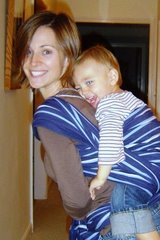Braeden and I went to an "open gym" hour at a local gymnastics studio today. Braeden loves going to open gym on Monday mornings-- he loves the bouncy house, the foam block pit, the balance beams, the hula hoops, and the trampolines; but he especially loves being around other kids.
I noticed last time that we were there that most of the kids at open gym already know each other-- they go to school together 3 or 4 days a week. (I don't know what the difference is between school and daycare anymore, other than most likely a higher tuition, as well as less guilt on the part of the parents. Believe it or not, around here, "educational" programs begin at as early as 12 months!) I have spent much time pondering the importance of "socialization" in infants and young toddlers. Shouldn't these babies be spending most of their time learning about the world from their parents? My friend insists that preschool is necessary for her 2-year-old daughter to become social. I would rather give my son a couple more years of blissful ignorance and supervised playgroups before throwing him into the lion's den.
Judgments about preschool aside, I followed Braeden into the gym, staying a few steps behind him. After about 10 minutes of playing solo and watching the other kids, he started approaching children and trying to play with them. A few kids were willing to have short "exchanges" with him, but as we made our way around the gym, I was amazed by how many toddler cliques I saw! When Braeden walked up to one girl who had other friends around her, she pushed and kicked him and yelled until I led him away. This didn't seem to phase Braeden, but it did kind of bother me. And not in a protective-mother way, either.
My mother tells me that when she was a baby, the early introduction of solid foods was seen as a sign of an "advanced" baby. Some babies were fed cereal at three weeks of age! We know now, thanks to a better understanding of nutrition and our bodies, that early introduction of solids can be detrimental to a tiny, developing digestive system. Part of me wonders if we're not doing a similar thing with super-early childhood education in a classroom setting. Are babies and toddlers ready for this kind of harsh socialization? Are they going to grow up with an overly negative, almost jaded view of their peers?
I wasn't startled by the fact that the children identified their friends and ended up playing in groups. What surprised me was how exclusionary they were, at such a young age. I have to wonder how many vital social skills these children are not learning because they are being forced to acquire the social skills that are usually reserved for, say, kindergartners.
At the same time that I was observing these children in their closely-guarded packs, I noticed that most of the mothers were doing the same thing. They gathered in tight groups and chatted, only occasionally breaking loose to attend to their children. There were a couple of other mothers, like me, drifting around... and in fact, I was able to find another breastfeeding mother. It only took yanking up my shirt and attaching Braeden to my right nipple to catch the attention of a fellow nursing mother across the room. We smiled and waved, both visibly relieved to not be "the only one." While we sat down and chatted, Braeden ran back toward the other children and practiced his budding social skills for another few minutes. He didn't seem to care how many people liked him or tried to play with him. He's still in the stage where he's just learning to communicate with others. I, on the other hand, feeling somewhat rejected by and isolated from the other mothers, breathed a deep sigh of relief as we left open gym. Maybe I'll try to tap into Braeden's innately un-socialized sense of self this week.
Subscribe to:
Post Comments (Atom)

No comments:
Post a Comment